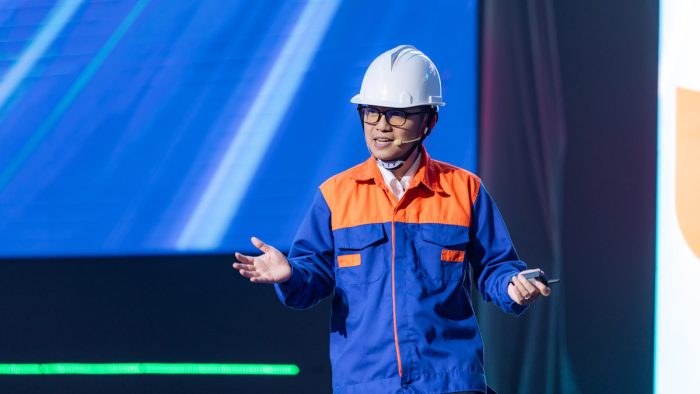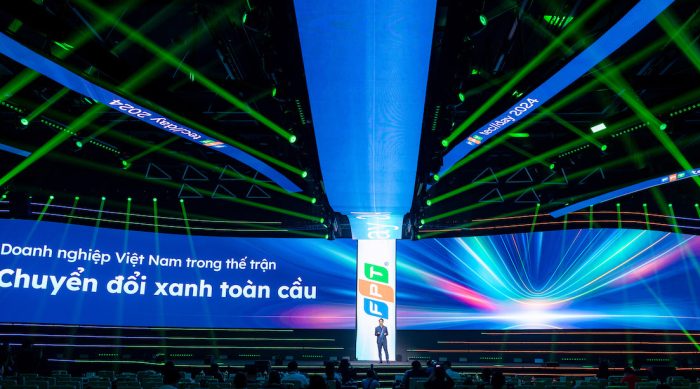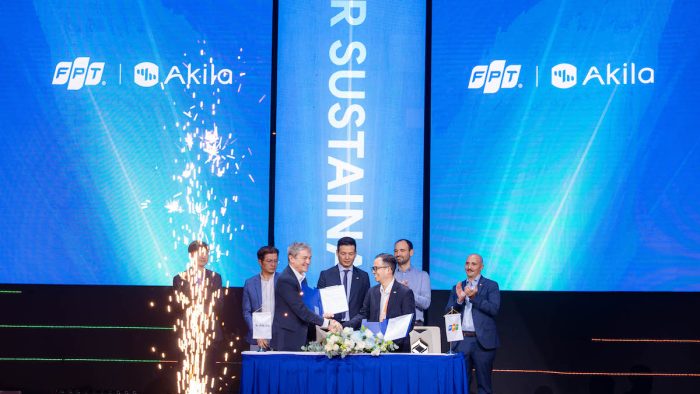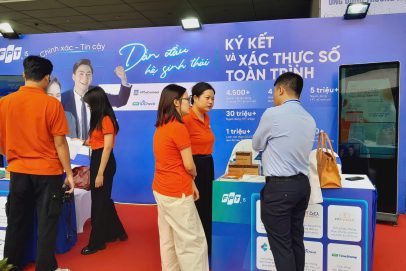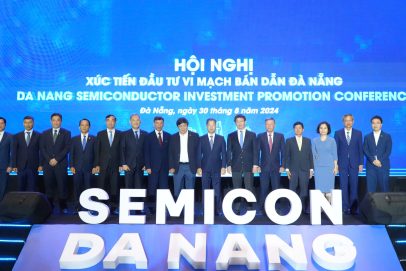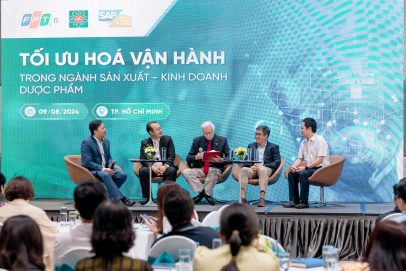The Position of Vietnamese Enterprises in the Global Green Transformation
The picture of green transformation at many Vietnamese businesses has been partially unveiled through the story of an emissions auditor at the recent FPT Techday 2024 event.
The “Reluctant” Emissions Inventory Worker
Stepping onto a stage observed by thousands of technology enthusiasts, Mr. Tran Duc Tri Quang, Chief Data Officer at FPT IS, FPT Corporation, appeared in a worker’s uniform and white safety helmet, humorously referring to himself as a “reluctant emissions inventory worker.”
”At the start of our emissions inventory job, we were confident because we understood the processes and methodologies for classifying emissions in line with international standards. But once we got hands-on, we realized how challenging this journey truly was,” Mr. Quang recounted.
The biggest challenge arose from clients requesting FPT to provide emissions data for third-party products and services, in addition to the familiar emissions categories used in production and business operations such as fuel, electricity, and gas.
“Back in 2020, a single such request from a client took us three months to review one million lines of invoices,” Mr. Quang recalled.
But that was not the final number that the FPT inventory team had to handle. At FPT, approximately 10 million lines of tax invoices like that accumulated each year, ranging from the purchase of equipment and machinery to wireless mice, keyboards, USB, etc.
“How much emissions does a USB generate? Honestly, we didn’t know.” Just for the first 10,000 lines of tax invoices, the Chief Data Officer of FPT IS spent about a week to audit and report the emissions.
Therefore, with one million or even ten million lines, it would require 100, or even 1,000 people to do this task. However, the highest risk is the significant instability in accuracy due to the manual process.
Mr. Tran Duc Tri Quang, Chief Data Officer at FPT IS, FPT Corporation.
“We were no different from craftsmen. If we kept doing it this way, every year FPT would need a large team just to count, and we wouldn’t be able to complete other tasks,” Mr. Quang affirmed.
From this point, the FPT team developed an API designed to answer the question: how much emissions does any given product generate? By simply inputting the data, the API would return the result – for instance, a USB generates approximately 2.6 kg of CO2 during production and transportation.
Thanks to this, instead of spending a week processing 10,000 invoice lines, Mr. Quang now only takes about 5 seconds. Similarly, for the 10 million invoice lines of the entire corporation, the emissions inventory and reporting process takes less than 2 minutes.
“Of course, the solution doesn’t solve everything. It only addresses 95-96% of the task, and human involvement is still necessary,” emphasized the Chief Data Officer at FPT IS.
Among which, the spirit of FPT is to accompany businesses and people in greening the economy. Starting from December 2024, the above-mentioned API will be widely shared with businesses, allowing them to independently visualize and calculate emissions during their operations.
Mr. Tran Duc Tri Quang called this the first step in the green transformation process. “VertZéro will serve as a gateway, helping Vietnamese businesses overcome technical barriers to sustainable development,” said Mr. Quang.
The pressure on the new chessboard
Mr. Quang mentioned the green transformation process because it is now considered a practical task for businesses globally.
According to statistics, more than 147 countries, representing nearly 93% of the global GDP, have committed to achieving net-zero emissions and have plans to gradually reduce their dependence on fossil fuels.
Globally and in Vietnam, green transformation has become a hot topic. At the COP26 conference, the Prime Minister made a strong commitment and set a vision to achieve net-zero emissions by 2050.
In Vietnam, following Decision No.13 signed by Deputy Prime Minister Tran Hong Ha and effective from October, 2,166 facilities will be required to conduct greenhouse gas inventory.
“This is not only a national mandate but also a guiding principle and a source of inspiration for domestic businesses to step into the globalized playing field,” said Mr. Nguyen Tuan Anh, Director of Consulting at FPT Digital, FPT Corporation.
Mr. Tuan Anh likened the green transformation journey to a “new chessboard,” a game not reserved solely for developed countries, but one that now includes Vietnam as well.
The leader of FPT Digital compared the green transformation journey to a “new chessboard”
“Normally, transformation waves are led by countries like the US, Europe, or China. However, the world is changing, and the green transformation landscape is shifting. We believe that this is the only opportunity and the right time for Vietnam to change its position on the ‘new playing field’ of global green transformation,” the leader of FPT Digital affirmed.
The expert believed that there are two things Vietnamese businesses can achieve on this “new chessboard”, which are minimizing the damage from greenhouse gas emission policies, and leveraging the opportunity to gain a more advantageous position than competitors in the new supply chain.
Vietnam’s advantage in the green transformation race is having the largest renewable energy reserves in Southeast Asia, with a capacity of 1,000 GW (according to IRENA’s report), surpassing even Indonesia – a country six times the size of Vietnam.
In addition, with its strategically important geopolitical position and an increasingly significant role in the global supply chain, Vietnam has every reason to believe that green certification will further solidify its status as the premier destination in ASEAN for anchor investors.
“Green transformation will also help Vietnamese businesses attract green financing, develop a circular economy, increase revenue, optimize operational efficiency, and gain access to the latest global technologies, as these technologies inherently require high levels of sustainability and environmental friendliness. Green transformation is both a national mandate and a guiding principle, serving as an inspiration and motivation for domestic businesses to step into the game of globalization,” Mr. Tuan Anh expressed confidently.
Leading the Green Transition for Vietnamese Businesses
Looking at developed countries like Japan, Mitsubishi has successfully combined green transformation with digital transformation to achieve its goal of reducing emissions by 50% by 2030.
The company has required its top engineers to develop initiatives to meet this objective, leveraging technologies such as recycling, researching new materials, and utilizing zero-emission energy sources like hydrogen and ammonia.
And an indispensable element in these initiatives is technology. With technology, Mitsubishi has been able to accelerate and enhance the efficiency of its green transformation process.
Another example is the Kalundborg industrial park in Denmark, which has implemented technologies for emission recovery and heat recovery, providing energy to surrounding households and factories. As a result, Kalundborg operates at 25-30% lower costs compared to other industrial parks.
Thirty years ago, Vietnam entered the wave of digital transformation, and today it is embracing green transformation, with an eye toward smart transformation that integrates artificial intelligence into the entire production and supply chain process.
With the wave of green transformation, the FPT team has chosen the keyword “accompany” This is because the ultimate goal of green transformation is to contribute to a greener planet, meaning no nation, organization, or business can operate in isolation during this process.
“With our technological capabilities, FPT aims to accompany businesses in building green transition roadmaps, as well as to explore new opportunities together in the future,” said a representative from FPT.
FPT and Akila sign a partnership agreement aimed at developing technology for carbon emissions inventory.
This is why FPT recently commercialized the greenhouse gas inventory platform called VertZéro by digitizing the process of data collection, calculation, reporting, and emissions inventory, ensuring compliance with international standards. It also integrates with ESG reporting tools to ensure transparency of data and sustainability goals.
Currently, VertZéro provides over 90,000 emission factors, serving businesses in 190 countries, and collaborates with more than 30 partners in the global green transition ecosystem, including carbon credit trading platforms and emissions reduction solution companies.
The solution helps optimize 80% of the reporting process and offers more than 120 emissions reduction solutions that meet international standards such as SBTi and MACC, enabling businesses to enhance their reputation, improve their competitive position, and expand their market.
“We believe that VertZéro will serve as a passport, helping Vietnamese businesses overcome technical barriers to sustainable development, which are often very stringent in developed markets such as North America and Europe,” FPT representatives shared.
First, the target users of VertZéro are businesses serving the export market. Next are businesses within global supply chains, as well as all businesses that believe in the path of sustainable development.
Currently, FPT is actively promoting connections with a global network of experts and partners from Europe, Japan, South Korea, and others, to share expertise and technology, helping Vietnamese businesses quickly access the global standards for green transformation practices.
At FPT Techday 2024, FPT and Akila signed a partnership agreement to develop technology for carbon emissions inventory, leveraging the “digital twin” data platform in the real estate industry to promote sustainability and optimize energy efficiency. Akila is a leading software provider specializing in digital solutions and carbon reduction technologies for the real estate sector in Singapore.


